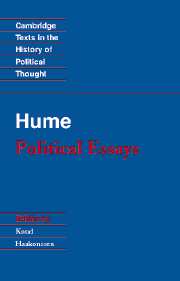Book contents
- Frontmatter
- Contents
- Acknowledgements
- Introduction
- Chronology
- Bibliographical notes
- A note on the text and the edition
- Biographical notes
- Bibliography
- Political Essays
- 1 Of the liberty of the press
- 2 That politics may be reduced to a science
- 3 Of the first principles of government
- 4 Of the origin of government
- 5 Of the independency of Parliament
- 6 Whether the British government inclines more to absolute monarchy, or to a republic
- 7 Of parties in general
- 8 Of the parties of Great Britain
- 9 Of superstition and enthusiasm
- 10 Of civil liberty
- 11 Of the rise and progress of the arts and sciences
- 12 Of national characters
- 13 Of commerce
- 14 Of refinement in the arts
- 15 Of money
- 16 Of interest
- 17 Of the balance of trade
- 18 Of the jealousy of trade
- 19 Of the balance of power
- 20 Of taxes
- 21 Of public credit
- 22 Of some remarkable customs
- 23 Of the original contract
- 24 Of passive obedience
- 25 Of the coalition of parties
- 26 Of the Protestant succession
- 27 Idea of a perfect commonwealth
- Appendix: Excerpts from Hume's History of England
- Notes
- Index
- Title in the Series
4 - Of the origin of government
Published online by Cambridge University Press: 05 June 2012
- Frontmatter
- Contents
- Acknowledgements
- Introduction
- Chronology
- Bibliographical notes
- A note on the text and the edition
- Biographical notes
- Bibliography
- Political Essays
- 1 Of the liberty of the press
- 2 That politics may be reduced to a science
- 3 Of the first principles of government
- 4 Of the origin of government
- 5 Of the independency of Parliament
- 6 Whether the British government inclines more to absolute monarchy, or to a republic
- 7 Of parties in general
- 8 Of the parties of Great Britain
- 9 Of superstition and enthusiasm
- 10 Of civil liberty
- 11 Of the rise and progress of the arts and sciences
- 12 Of national characters
- 13 Of commerce
- 14 Of refinement in the arts
- 15 Of money
- 16 Of interest
- 17 Of the balance of trade
- 18 Of the jealousy of trade
- 19 Of the balance of power
- 20 Of taxes
- 21 Of public credit
- 22 Of some remarkable customs
- 23 Of the original contract
- 24 Of passive obedience
- 25 Of the coalition of parties
- 26 Of the Protestant succession
- 27 Idea of a perfect commonwealth
- Appendix: Excerpts from Hume's History of England
- Notes
- Index
- Title in the Series
Summary
Man, born in a family, is compelled to maintain society, from necessity, from natural inclination, and from habit. The same creature, in his farther progress, is engaged to establish political society, in order to administer justice; without which there can be no peace among them, nor safety, nor mutual intercourse. We are, therefore, to look upon all the vast apparatus of our government, as having ultimately no other object or purpose but the distribution of justice, or, in other words, the support of the twelve judges. Kings and parliaments, fleets and armies, officers of the court and revenue, ambassadors, ministers, and privy-counsellors, are all subordinate in their end to this part of administration. Even the clergy, as their duty leads them to inculcate morality, may justly be thought, so far as regards this world, to have no other useful object of their institution.
All men are sensible of the necessity of justice to maintain peace and order; and all men are sensible of the necessity of peace and order for the maintenance of society. Yet, notwithstanding this strong and obvious necessity, such is the frailty or perverseness of our nature! it is impossible to keep men, faithfully and unerringly, in the paths of justice. Some extraordinary circumstances may happen, in which a man finds his interests to be more promoted by fraud or rapine, than hurt by the breach which his injustice makes in the social union.
- Type
- Chapter
- Information
- Hume: Political Essays , pp. 20 - 23Publisher: Cambridge University PressPrint publication year: 1994



